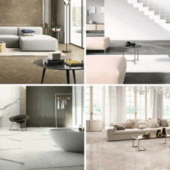Selecting the right tiles for your home is a crucial decision that significantly impacts both the aesthetics and functionality of your living spaces. Among the myriad of options available, the choice between wall tiles and floor tiles is a key consideration. While both serve distinct purposes, understanding their differences is essential for making informed decisions about your home decor. In this blog, we will delve into the nuances of wall tiles vs floor tiles, exploring their characteristics, uses, and factors that influence their prices.
- Material Composition
The primary difference between wall tiles and floor tiles lies in their material composition. Wall tiles are typically made from lighter materials such as ceramic or porcelain. These materials are chosen for their aesthetic appeal and ease of installation on vertical surfaces. In contrast, floor tiles are crafted from denser materials like porcelain or natural stone to withstand the weight and impact of foot traffic.
- Thickness and Durability
Due to their different applications, wall tiles are generally thinner and less dense compared to floor tiles. Wall tiles are designed to enhance the visual appeal of spaces, and their thickness is optimized for easy installation on vertical surfaces. Floor tiles, on the other hand, need to withstand the constant stress of foot traffic, making them thicker and more durable. This difference in thickness contributes to the overall strength and longevity of floor tiles.
- Surface Finish
Another key distinction between wall tiles and floor tiles lies in their surface finish. Wall tiles often feature a glossy or matte finish that enhances the visual appeal of walls, creating a decorative and reflective surface. In contrast, floor tiles prioritize functionality and safety, commonly featuring a textured or matte finish to provide traction and prevent slips.
- Resistance to Wear and Tear
Floor tiles are subjected to more wear and tear than their wall counterparts. As a result, floor tiles are engineered to be more resistant to scratches, abrasions, and heavy impacts. The durability of floor tiles ensures that they can maintain their appearance and structural integrity even in high-traffic areas.
- Water Absorption Rates
The water absorption rate is a critical factor that distinguishes between wall and floor tiles. Wall tiles have a higher water absorption rate, as they are not exposed to moisture and water as much as floor tiles. On the other hand, floor tiles have a lower water absorption rate to prevent water damage and maintain their structural integrity in wet environments.
- Size and Design
While both wall and floor tiles are available in various sizes and designs, wall tiles often offer more flexibility in terms of design and aesthetics. Wall tiles can be smaller and more intricately designed to create visually appealing patterns and textures. Floor tiles, on the other hand, are typically larger and come in more subdued designs to accommodate the broader expanse of flooring.
- Price Differences
The price difference between wall tiles and floor tiles is influenced by several factors. Floor tiles, being thicker and more durable, often come at a higher price point compared to wall tiles. Additionally, the material composition, finish, and design intricacy can contribute to variations in the prices of both wall and floor tiles. It’s essential for homeowners to consider their budget and specific requirements when making a decision.
Choosing the Best Tiles for Your Needs
When it comes to selecting tiles for your home, it’s crucial to consider the specific needs and functionalities of the space.
- Best Tiles for Walls
If you’re looking for tiles to enhance the visual appeal of your walls, wall tiles are the ideal choice. They come in a variety of designs, sizes, and finishes, allowing you to create a customized and aesthetically pleasing look for your interiors. Wall tiles are perfect for kitchens, bathrooms, and other areas where the primary concern is visual appeal rather than heavy wear.
- Best Tiles for Floors
For flooring applications, floor tiles are the preferred option. Their thickness, durability, and resistance to wear make them suitable for high-traffic areas such as living rooms, hallways, and entryways. Choose floor tiles with a textured finish for areas prone to spills or water exposure, ensuring both safety and longevity.
Where to Buy Wall and Floor Tiles
The choice between wall and floor tiles is a decision that significantly influences the overall ambiance of your home. When considering a purchase, explore reputable suppliers and showrooms that offer a diverse selection of high-quality tiles. Many suppliers also provide the option to buy wall and floor tiles online, offering the convenience of browsing through their inventory, reading customer reviews, and making an informed decision from the comfort of your home.
In conclusion, the difference between wall tiles and floor tiles extends beyond their appearance. Understanding their material composition, thickness, durability, and functionality is crucial for making informed decisions about their usage in different areas of your home. While wall tiles add a decorative touch to vertical spaces, floor tiles prioritize durability and safety in high-traffic areas.
When selecting tiles for your home, carefully consider the specific needs of each space and choose accordingly. Whether you opt for the intricate designs of wall tiles or the durability of floor tiles, your decision should align with the functionality and aesthetic goals of each area. Explore our , compare prices, and make a choice that not only suits your budget but also enhances the overall beauty and functionality of your living spaces.
If want to explore a variety of choices for tiles , visit our showroom today at 134, Opp. Forest Park, Nr. Yadav Petrol Pump, Pune-Nagar Road, or contact us at 8888843560. You can also explore our extensive selection of options online at www.chandanmarbles.com. Choose tiles from Chandan Marbles and upgrade both the beauty and the value of your property, securing an investment that’s as timeless as it is valuable.






